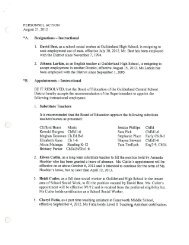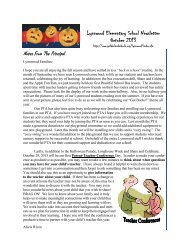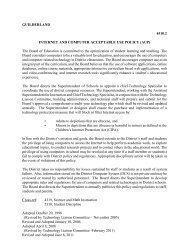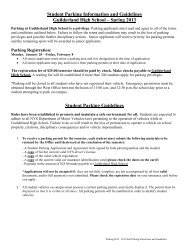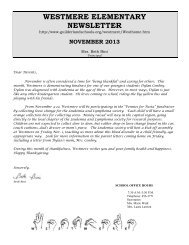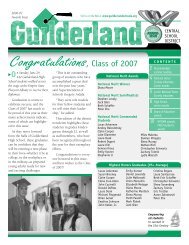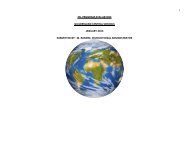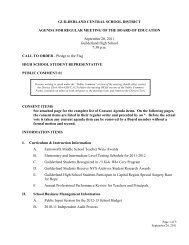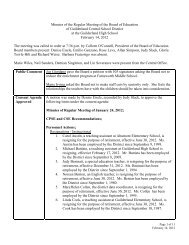How to Bring Our Schools Out of the 20th Century - Guilderland ...
How to Bring Our Schools Out of the 20th Century - Guilderland ...
How to Bring Our Schools Out of the 20th Century - Guilderland ...
Create successful ePaper yourself
Turn your PDF publications into a flip-book with our unique Google optimized e-Paper software.
"put an enormous premium on creative and innovative skills, seeing patterns where o<strong>the</strong>r people see only<br />
chaos," says Marc Tucker, an author <strong>of</strong> <strong>the</strong> skills-commission report and president <strong>of</strong> <strong>the</strong> National Center<br />
on Education and <strong>the</strong> Economy. Traditionally that's been an American strength, but schools have become<br />
less daring in <strong>the</strong> back-<strong>to</strong>-basics climate <strong>of</strong> NCLB. Kids also must learn <strong>to</strong> think across disciplines, since<br />
that's where most new breakthroughs are made. It's interdisciplinary combinations--design and<br />
technology, ma<strong>the</strong>matics and art--"that produce YouTube and Google," says Thomas Friedman, <strong>the</strong> bestselling<br />
author <strong>of</strong> The World Is Flat.<br />
Becoming smarter about new sources <strong>of</strong> information. In an age <strong>of</strong> overflowing information and<br />
proliferating media, kids need <strong>to</strong> rapidly process what's coming at <strong>the</strong>m and distinguish between what's<br />
reliable and what isn't. "It's important that students know how <strong>to</strong> manage it, interpret it, validate it, and<br />
how <strong>to</strong> act on it," says Dell executive Karen Bruett, who serves on <strong>the</strong> board <strong>of</strong> <strong>the</strong> Partnership for 21st<br />
<strong>Century</strong> Skills, a group <strong>of</strong> corporate and education leaders focused on upgrading American education.<br />
Developing good people skills. EQ, or emotional intelligence, is as important as IQ for success in <strong>to</strong>day's<br />
workplace. "Most innovations <strong>to</strong>day involve large teams <strong>of</strong> people," says former Lockheed Martin CEO<br />
Norman Augustine. "We have <strong>to</strong> emphasize communication skills, <strong>the</strong> ability <strong>to</strong> work in teams and with<br />
people from different cultures."<br />
Can our public schools, originally designed <strong>to</strong> educate workers for agrarian life and industrial-age<br />
fac<strong>to</strong>ries, make <strong>the</strong> necessary shifts? The Skills commission will argue that it's possible only if we add<br />
new depth and rigor <strong>to</strong> our curriculum and standardized exams, redeploy <strong>the</strong> dollars we spend on<br />
education, reshape <strong>the</strong> teaching force and reorganize who runs <strong>the</strong> schools. But without waiting for such a<br />
revolution, enterprising administra<strong>to</strong>rs around <strong>the</strong> country have begun <strong>to</strong> update <strong>the</strong>ir schools, <strong>of</strong>ten with<br />
ideas and support from local businesses. The state <strong>of</strong> Michigan, conceding that it can no longer count on<br />
<strong>the</strong> ailing au<strong>to</strong> industry <strong>to</strong> absorb its poorly educated and low-skilled workers, is re<strong>to</strong>oling its high<br />
schools, instituting what are among <strong>the</strong> most rigorous graduation requirements in <strong>the</strong> nation. Elsewhere,<br />
organizations like <strong>the</strong> Bill and Melinda Gates Foundation, <strong>the</strong> Carnegie Foundation for <strong>the</strong> Advancement<br />
<strong>of</strong> Teaching and <strong>the</strong> Asia Society are pouring money and expertise in<strong>to</strong> model programs <strong>to</strong> show <strong>the</strong> way.<br />
What It Means <strong>to</strong> Be a Global Student<br />
Quick! <strong>How</strong> many ways can you combine nickels, dimes and pennies <strong>to</strong> get 20¢? That's <strong>the</strong> challenge for<br />
students in a second-grade math class at Seattle's John Stanford International School, and hands are flying<br />
up with answers. The students sit at tables <strong>of</strong> four manipulating play money. One boy shouts "10 plus 10";<br />
a girl <strong>of</strong>fers "10 plus 5 plus 5," only it sounds like this: "Ju, tasu, go, tasu, go." Down <strong>the</strong> hall, thirdgraders<br />
are learning <strong>to</strong> interpret charts and graphs showing how many hours <strong>of</strong> sleep people need at<br />
different ages. "¿Cuantas horas duerme un bebé?" asks <strong>the</strong> teacher Sabrina S<strong>to</strong>rlie.<br />
This public elementary school has taken <strong>the</strong> idea <strong>of</strong> global education and run with it. All students take<br />
some classes in ei<strong>the</strong>r Japanese or Spanish. O<strong>the</strong>r subjects are taught in English, but <strong>the</strong> content has an<br />
international flavor. The school pulls its 393 students from <strong>the</strong> surrounding highly diverse neighborhood<br />
and by lottery from o<strong>the</strong>r parts <strong>of</strong> <strong>the</strong> city. Generally, its scores on state tests are at or above average,<br />
although those exams barely scratch <strong>the</strong> surface <strong>of</strong> what Stanford students learn.<br />
Before opening <strong>the</strong> school seven years ago, principal Karen Kodama surveyed 1,500 business leaders on<br />
which languages <strong>to</strong> teach (plans for Mandarin were dropped for lack <strong>of</strong> classroom space) and which skills<br />
and disciplines. "No. 1 was technology," she recalls. Even first-graders at Stanford begin <strong>to</strong> use<br />
PowerPoint and Internet <strong>to</strong>ols. "Exposure <strong>to</strong> world cultures was also an important trait cited by <strong>the</strong><br />
executives," says Kodama, so that instead <strong>of</strong> circling back <strong>to</strong> <strong>the</strong> Pilgrims and Indians every autumn,<br />
20



